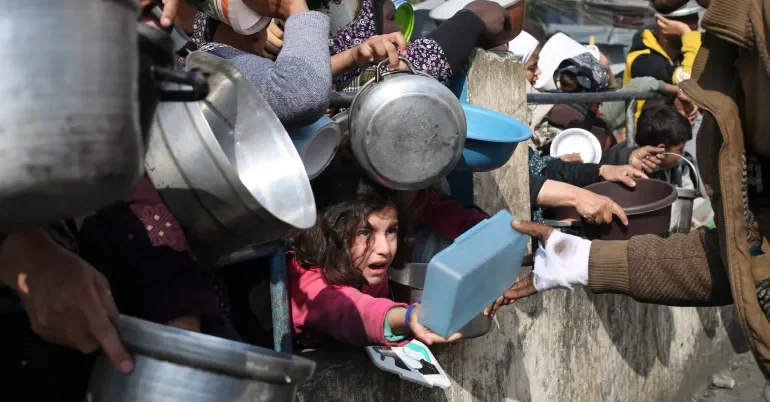GAZA is the “hungriest place on Earth” and its entire population is at risk of famine, warns the United Nations, as desperate Palestinians are shot at, starved, and forced from their homes by the Israeli forces.
Calling on Israel to stop its campaign of deliberate starvation and allow food into the besieged enclave, the UN on Friday said its mission to help Gaza’s Palestinians is the “most obstructed in recent history”.
“The aid operation that we have ready to roll is being put in an operational straitjacket that makes it one of the most obstructed aid operations, not only in the world today, but in recent history,” the UN Office for the Coordination of Humanitarian Affairs (OCHA) spokesperson, Jens Laerke, said.
He said out of 900 aid trucks that were approved to enter from the Israeli side of the Karem Abu Salem crossing, known as Kerem Shalom in Israel, fewer than 600 have been offloaded in Gaza, adding that a lower amount of aid had been picked up for distribution.
“I have no flour, no oil, no sugar, no food. I collect mouldy bread and feed it to my children. I want to get a bag of flour for my children. I want to eat. I’m hungry,” a Palestinian told Al Jazeera.
Reporting from Gaza City, Al Jazeera’s Hani Mahmoud said the northern part of the Strip, which includes Gaza City, “has not seen a drop of aid coming in that has been allowed in the past few days”.
“People in the central area, in the [southern] city of Khan Younis and Rafah are also struggling on a daily basis to find food supplies, particularly when it comes to flour and other basic necessities to help them survive these difficult conditions,” he added.
After a nearly three-month blockade, Israel, under pressure from Western governments and international humanitarian organisations, allowed limited aid to enter the enclave and the resumption of limited UN operations.
However, Israel also pushed for the Gaza Humanitarian Foundation (GHF), a shadowy United States-backed private aid distributor, to provide essential food aid to starving Palestinians.
The UN and other aid groups have refused to work with GHF, saying it lacks neutrality and its distribution model forces the displacement of Palestinians.
Still, UN spokesperson Stephane Dujarric told reporters on Friday that while any aid that gets to those who need it is “good”, aid deliveries are having “very, very little impact”.
“The catastrophic situation in Gaza is the worst since the war began,” he said.







